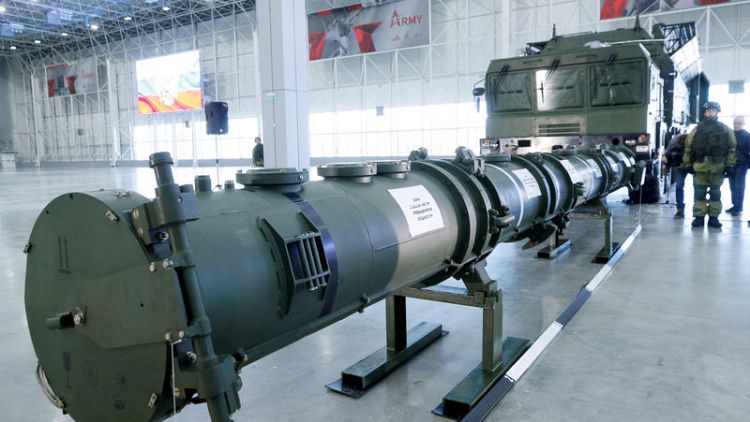By Lesley Wroughton and Arshad Mohammed
WASHINGTON (Reuters) - The United States announced on Friday it will withdraw from the Intermediate-range Nuclear Forces Treaty with Russia in six months unless Moscow ends its alleged violations of the landmark 1987 arms control pact.
The United States would reconsider its withdrawal if Russia, which denies violating the treaty, came into compliance with the agreement, which bans both nations from stationing short- and intermediate-range land-based missiles in Europe.
U.S. Secretary of State Mike Pompeo, in announcing the move, said the United States would cease complying with the treaty starting Saturday, when a senior U.S. official also told reporters Washington will formally inform Moscow of its intent to withdraw.
The announcement may aim to pressure Russia to come to terms during the next six months but it also raised fears of a new U.S.-Russian nuclear arms race in Europe as well as one between the United States and China in Asia.
U.S. President Donald Trump repeated U.S. allegations that Russia had violated the INF treaty, which limited only U.S. and Russian arsenals, and he held out the prospect of negotiating a wider agreement, possibly including other nations.
"I hope that we’re able to get everybody in a big and beautiful room and do a new treaty that would be much better. Certainly I would like to see that," Trump told reporters.
Trump's tenure has been dogged by allegations - which Moscow denies - that Russia interfered in the 2016 U.S. election to help his candidacy. The dispute over INF has contributed to U.S.-Russia frictions, now at their worst since the Cold War ended in 1991 despite Trump's stated desire for better ties.
"If Russia does not return to full and verifiable compliance with the treaty within this six-month period by verifiably destroying its INF-violating missiles, their launchers, and associated equipment, the treaty will terminate," Pompeo told reporters.
RUSSIA SEES FALSE PRETEXT
Russian officials accused the United States of inventing a false pretext to exit a treaty that it wants to leave anyway so it can develop new missiles.
The United States alleges a new Russian cruise missile violates the pact. The missile, the Novator 9M729, is known as the SSC-8 by the North Atlantic Treaty Organization (NATO).
The treaty required the parties to destroy ground-launched ballistic and cruise missiles with ranges of between 500 and 5,500 km (310 to 3,420 miles). Last week, the head of Russia's military's missile and artillery forces said the new missile's maximum range fell short of the treaty's lower limit.
Russia has rejected the U.S. demand to destroy the new missile.
"America really wants to develop new weapons systems which are in breach of this treaty," Konstantin Kosachyov, a senior Russian lawmaker, wrote on social media.
A few hours before Pompeo's announcement, the NATO Western security alliance issued a statement saying it would "fully support" the U.S. withdrawal notice.
Speaking before Pompeo's announcement, German Chancellor Angela Merkel emphasized the importance of using the six-month window to keep talking.
Formal U.S. withdrawal could give the Pentagon new options to counter Chinese missile advances but experts warn the ensuing arms race could greatly escalate tensions in the Asia-Pacific.
The United States will notify Russia on Saturday of its plan to pull out in six months, a senior U.S. official told reporters, describing this as "one final chance" to comply with the agreement but saying Washington doubted Moscow would do so.
He said the administration is weighing whether to extend the "New Start" arms control treaty, which went into effect in 2011 and required both nations to cut deployed strategic nuclear warheads to no more than 1,550, the lowest level in decades.
That treaty, which also limits deployed land- and submarine-based missiles and nuclear-capable bombers, expires in February 2021, can be extended by five years if both sides agree.
(Reporting By Makini Brice, Susan Heavey, Steve Holland, Jonathan Landay, Arshad Mohammed and Lesley Wroughton; Additional Reporting by Reporting by Gabriela Baczynska in BRUSSELS and Andrey Kuzmin and Andrew Osborn in MOSCOW; Writing by Arshad Mohammed; Editing by Bill Trott)
